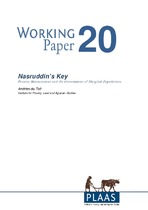| dc.contributor.author | du Toit, Andries | |
| dc.date.accessioned | 2019-03-11T10:39:48Z | |
| dc.date.available | 2019-03-11T10:39:48Z | |
| dc.date.issued | 2011 | |
| dc.identifier.citation | du Toit, A. (2011). ‘Nasruddin’s key: Poverty measurement and the government of marginal populations’, Working Paper 20. PLAAS, UWC, Cape Town. | en_US |
| dc.identifier.uri | http://hdl.handle.net/10566/4479 | |
| dc.description.abstract | This paper considers the role of ‘measurement’ and other forms of poverty knowledge in a context where the nature and direction of global economic growth is creating ‘surplus populations’ suffering various forms of marginalisation in the global economy. It links the development of different forms of poverty knowledge with the ways in which states and non-state agents seek to ‘govern’ poverty and poor populations, and with the ‘biopolitics’ whereby calculations are made about the differential allocation of resources towards different sectors of the global population. The paper argues that addressing the root causes of poverty requires social actors to go beyond the narrow limits of institutionally sanctioned and bureaucratically invested ‘poverty knowledge’ that currently dominate policy thinking. Rather than seeking to understand poverty by measuring the characteristics of members of populations, they should try to understand poverty as an aspect of social relations, and try to come to grips with differential insertion of populations in the fields of force of modern globalised capitalism. Analysis should abandon simple notions of ‘marginalisation, and come to grips with the agency of poor people and the complex relationships between informality, marginality, exclusion and incorporation. Ultimately, however, a more nuanced understanding of the role of poverty knowledge in present day biopolitics does not bring with it any easy answers: rather, it challenges applied social scientists to be more aware of the responsibilities they bear as producers of 'useful' knowledge in a time of increased global instability. | en_US |
| dc.language.iso | en | en_US |
| dc.publisher | Institute for Poverty, Land and Agrarian Studies, University of the Western Cape | en_US |
| dc.relation.ispartofseries | Working Paper;20 | |
| dc.subject | Marginalisation | en_US |
| dc.subject | Poverty knowledge | en_US |
| dc.subject | Biopolitics | en_US |
| dc.subject | Poverty measurement | en_US |
| dc.title | Nasruddin’s key: Poverty measurement and the government of marginal populations | en_US |
| dc.type | Working Paper | en_US |

